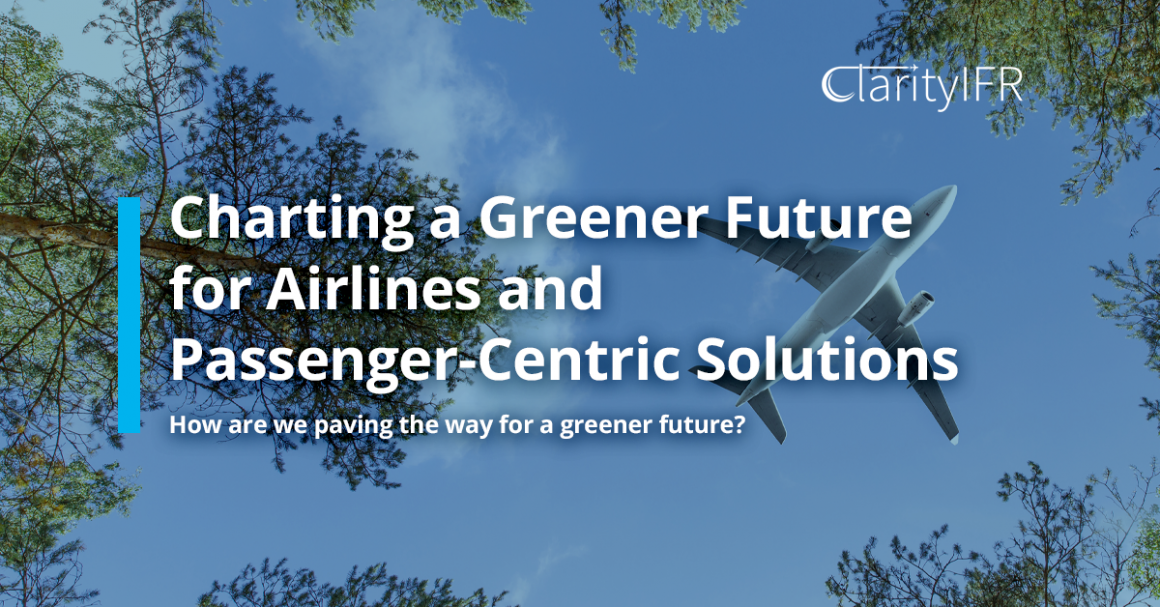How are we paving the way for a greener future for airlines? By putting the passengers at the centre and actively working to make flights greener through innovative inflight products and services. Data Clarity leverages its expertise in multi-vendor product integration alongside its industry-leading In-Flight retail solution ClarityIFR – delivering valuable solutions to meet those demands.
The industry itself has long recognised the need to reduce emissions. Following the introduction of ‘Fly Net Zero by 2050’ policies according to IATA, the aviation industry is actively working to reduce carbon emissions in response to evolving consumer values and to contribute to global efforts in reducing climate change.
While the extensive research and development of sustainable aviation fuel is often considered as the number one solution to make air travel more sustainable, there are numerous avenues to enhance sustainability initiatives.
To put simply, ‘weight’ and ‘waste’ are two prominent buzzwords of inflight retail when it comes to sustainability and plays a significant role in airlines’ carbon footprint. Airlines place great emphasis on reducing weight onboard as it directly correlates with minimising fuel consumption per flight, regardless of whether sustainable fuel is used or not. From passenger seat occupancy, and everything in between, airlines are consistently striving to reduce weight and pursue a ‘Sustainable Cabin’ initiative across the inflight experience.
To identify improvement, stakeholders, including investors, have high expectations for airlines and industry players to provide improved data and concrete evidence of their genuine progress in tackling climate change. Implementing a clear and practical strategy that generates tangible results is vital to instill confidence and move beyond mere projects. Such strategy not only fosters an understanding among all stakeholders, but also enables them to stay ahead of evolving customer expectations. Why? Because continuous alignment of an airlines’ offerings and services to meet customer needs enables the industry to enhance customer satisfaction, loyalty and overall success.
Empowering airlines to anticipate and respond effectively to customer demands through inflight products and services will drive sustainable, long-term loyalty growth.
At the core of the strategy are three key pillars: Passengers, Planet, and Profit, which guide our approach and drive our actions.
- Passengers are the lifeblood of aviation and empowering them with intuitive AI enabled applications to allow for Pre-Ordering, Buy on Board, and Buy-at-Seat transactions to predict further and defined preferences, and manage allergy requirements. By doing so, we can enhance the passenger inflight experience and deliver hyper-personalisation through tailored offers relevant to their journey and unlock revenue opportunities.
- The Planet is of utmost importance to all of us. Recognising the significant role the aviation industry places in building a better future, it is crucial to understand effective methods of reducing fuel consumption.
- The aviation industry is progressively investing in retail offerings, leading to a race among airlines to streamline the passenger-purchase journey. By introducing multiple points of sale prior, during and after flights, airlines aim to operate as high-end retailers. Tracking and measuring Profit on this revenue stream, similar to every retailer on the high street, becomes a primary objective.
To responsibly contribute to these sectors, we advocate the “Right Product, Right Flight, Right Passenger” approach. By ensuring that the products offered, flights operated, and passengers served align with sustainable practices, we can promote responsible growth towards making a greener future for airlines and generate positive impacts on communities in the world economy.
The aim is to only fly what you only expect to sell, avoiding excessive inventory. Did you know the majority of airlines only witness conversion rates as low as 15%? By selecting products aligned with optimised supply chains, conversion rates can rapidly surpass 80%
Effectively integrating solutions that leverage AI to predict seat occupancy rates, analyse passenger profiles, and understand their product preferences on each flight departure is essential. This allows the last mile provider to dynamically respond to passenger demand, minimising unnecessary carbon emissions.
Preventing scenarios like the “Million Miles Mars Bar,” where overstocked items contribute to avoidable emissions, becomes vital. A single overstocked item can result in approximately 0.21 tonnes of carbon dioxide emissions.
Optimising conversion rates through dynamic bar-sets instead of standard bar-set algorithms empowers airlines to enhance profitability and deliver personalised passenger experiences – an approach which minimises fuel waste on unsold products, benefiting both the environment and bottom line.
By embracing ‘Passenger, Planet, Profit’ principles and prioritising passenger-centric solutions, the aviation industry can accelerate its sustainable transformation and contribute to a greener future for airlines.

